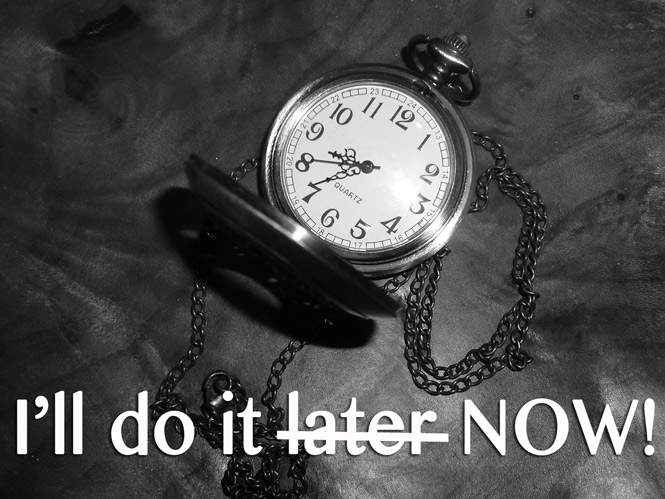Why do we love to procrastinate?

It is an undoubted truth, that the less one has to do, the less time one finds to do it in. ~Earl of Chesterfield
First, the obvious: Everyone procrastinates.
I do it, my corporate and entrepreneur friends and the ones in between do it and I know for a fact that super successful gurus do it on occasion too. It’s just a human thing to put off what we could get done now for later. So relax. You’re not alone.
Reminder: You can still grab The Positive Affirmations for Life program with more than 4 hours of audio affirmations for 7 life situations that impact your happiness and success the most.
But the ones who get a lot done in short periods of time and seem untouchable by excuses that plague the rest of us simply have learned how best to manage their procrastination tendencies. You can too. I’ll tell you how.
Procrastination is not in your DNA make-up, it is not inherited from your parents or siblings and it most certainly does not “run” in your family – in fact, removing that phrase altogether from your vocabulary can improve your life drastically.
Procrastination is a bad habit that has formed over the years, and in order to break this habit, you must create enough reason and momentum to build the opposite habit, the habit of getting things done.
Let’s find out why we procrastinate first.
Getting things done is hard work, definitely harder than getting nothing done. Or getting easy things done. Right?
We are creatures of comfort so we resist the notion of hard work, because it translates to discomfort and maybe even pain.
We might have to move our bodies and put in effort and concentrate and focus and even break a sweat. So we resist.
These walls of resistance manifest in the simplest and costliest form in our lives: Procrastination.
But here’s the irony. Procrastinating is actually harder on you over time than overcoming resistance and doing the work.
Why?
Because procrastination can cause fatigue and stress and anxiety. It can leave you feeling empty and dissatisfied with yourself. It makes you feel guilty and nags you like an annoying fly in your bedroom in the middle of the night.
On the other hand, completing a task elevates you to high levels of true happiness, gives you a sense of accomplishment, and makes you more productive for the next task.
Nothing is so fatiguing as the eternal hanging on of an uncompleted task. ~William James
So the question is, which feeling do you want more?
Getting in the flow of getting it done. You know this.
Tell me if this is not true for you. When you actually commit to doing something, you get it done fast and without any fuss. You are focused. Your decision drives you, and you know what needs to happen and you just do it.
Plus the satisfaction that comes from your results generates even more creativity and productivity.
Those are the times you are in the zone. You are on top of it. You are untouchable by delays and excuses. You are doing your best and moving towards your goals and desires.
You love this feeling of completion. You secretly prefer this feeling to stress of procrastinating and yet you manage to procrastinate on a whole lot of things. Why is that?
Because you have a habit of procrastinating. But the good news about habits is that you can break them by interrupting them and replacing them with better, more fruitful habits.
18 ways to learn how to stop procrastinating now.
1. Determine if it’s worth doing.
You might just be procrastinating because you don’t want to do something for a good reason. It may be a job you hate, a procedure you can’t stand, a part of your life that you simply want to escape. That is different from procrastinating on your dreams and real goals.
To this, I would say examine the task at hand before doing it because why do something you hate with so many opportunities to do what we love?
2. Tiptoe in to see what happens.
Pick the thing you are procrastinating right now and just tiptoe in to see what happens. Do a fraction of it. Then decide how you feel about the advice.
Often you overwhelm yourself with the idea of doing it all and then you sit on it because it’s too much. What if you just did 15 minutes or half an hour? What if you got on board for just a wee bit to get a taste and break the waiting cycle?
3. Don’t listen to your moods. They lie.
The strongest reason we procrastinate is because we just “don’t feel like doing it!” You know what happens if you listen to that lousy mood? Nothing happens!
So before you do whatever you need to do, change your mood with a meditation track or check out my popular 10 Minute Invigorator Program that is guaranteed to switch up your mood in 10 minutes or less.

4. Clean up the environment.
The environment you surround yourself with can either perpetuate your procrastination or nip it in the bud. Take a look at your desk, your house, your space where you need to do this work. Is it clean or cluttered?
Have courage and clean up the mess, throw away the rubbish you don’t need, and create a peaceful and productive space that is inducive to creativity and positivity.
5. Commit to it loud and clear.
In the first 20 minutes of my 6am Ashtanga yoga practice, a voice inside me is complaining and fussing “This is way too hard at this crazy hour. Let me go back to bed. Stop! I don’t feel like it!” And I know right then that if I give power to that mental shift, if I don’t commit loudly to the breath and the practice, if I stare at the clock, then I might as well go home.
Commit already. Commit loud. Commit and mean it. Commit to yourself.
6. Share your commitment with one person.
Choose one person, a partner, a spouse, a role model, a good friend, and tell them you committed to something specific, with dates and times. Ask if they please hold you accountable in a friendly but firm way?
The best partner is someone who may need the encouragement too. What is it that they are procrastinating on? Can you keep one another honest? Of course you can! Together, you are twice as strong!
7. Stop playing the victim card.
Why do we glorify being a victim of circumstance? Why do complainers get so many listening ears? There is nothing sexy or healthy about playing the victim, trust me.
Be your own hero instead. Be a warrior of peace. Be strong and tall and grateful for life. Stop the victim mindset and when it creeps in, just change it by telling yourself that you are in charge.
8. Kill the excuses. Abolish the distractions.
In order to do this, you must first know the definition of an excuse and a distraction. The dictionary definition says an excuse is “a reason put forward to conceal the real reason for an action.”
Excuses and distractions build the walls of resistance, but only if you give them focus and attention. Put your focus and attention where it belongs: on the task at hand.
9. Maximize the small chunks of time.
You have got to manage your time well if you want to be a success. One good news is that you don’t need large chunks of time to get things done.
If you can’t dedicate an hour or two a day to something that matters to you, you can start with 15 minutes or 30 minutes a day, but for the long term, think about a fundamental shift in your lifestyle design. For now, use the 10-minute chunks everywhere you can find them.
10. Let the power of mantra guide you.
Mantras are positive affirmations you repeat to yourself over and over. This can help you achieve this. You can even synchronize your breathing. In-breath will do the first half of the mantra and out breath the second half.
Some of my favorites are “If they can, so can I” and “I’ll do it now so I can reap the reward later.” Choose your own mantra and repeat it.
11. Turn a deaf ear to your lizard brain.
The inner voice is negative, it is your lizard brain, as Seth would tell us, and if you let it loose, it will destroy your mind with negativity. Stop listening to it by not focusing on it.
Recognize when you may be entering your lizard brain, it’s usually when you doubt your ability to get something done. Even if you don’t believe in yourself at first, keep repeating your positive mantra to quiet the negativity.
12. Visualize the end goal. See it in your mind’s eye.
Visualization is a powerful exercise that helps you focus on the end goal. It is a proven technique that kills procrastination and motivates you to high levels of success.
It takes a lot of focus and attention to seeing the end goal and how it can manifest itself in your life. Start with creating a vision board if you want to give this a full try.
13. Create enough pain to move you to action.
Pain moves you to action. It was pain that led me out of my corporate life and into running my own businesses. If you have enough pain, you will start doing. And if you told me that you wanted out of the corporate world but you are sitting around not taking any action, it’s because you are not in enough pain to take action.
So are you in pain from not doing what needs to be done? Let’s take weight loss. Are you in enough anguish from your weight and health problems to take action yet? If not, then can you creatively create more pain (yes I am asking you to create more pain in your comfortable state)?
14. Harness the fear and win.
Say no to fear. Fear is procrastination’s best ally so it’s bound to show up. Just don’t accept it. Don’t invite it in. Engage it in conversation to calm your nerves, to be in charge, to have control. If you can do this once, you can do it again and soon it becomes a habit.
Who hasn’t had a conversation with oneself? Why not make it a good one? In the privacy of your thoughts, ask yourself why you are procrastinating, what it is, is it fear, is it laziness, is it lack of knowledge? What is at your soft core? Listen to the whispers coming back. Then let your own inner guide help you push past the fear.
15. Cultivate self-discipline.
It’s either the pain of getting self-disciplined now or tasting the bitter pill of regret later. When put in that perspective, it is a quick decision. To translate it to action, create your own small habits that will build up your productivity.
Everyone is different. Cultivate at the pace what works for you, maybe an hour early in the morning, maybe a Sunday night ritual, maybe timing yourself, maybe working in complete isolation. Find that magic habit that works for you. That’s your self-discipline.
16. Make that deadline count.
Setting deadlines is easy to do and hard to keep. Nothing could be easier than putting a date on the calendar so how do you make it count if you hate deadlines? Put some repercussions in place.
Tell yourself that if you are not done by this date, you have to give up on something you really like. For me, the ultimate punishment would be my daily good tea. What do you want to give up if you don’t meet that deadline?

17. Drop the perfectionism.
Perfectionism is not something to be proud of. It is a habit that holds you back from delivery results. Don’t mistake it with high quality. Of course you must delivery your highest work at the best quality, but perfection? Do you think that it even exists?
Have you ever achieved the state of perfectionism and been rewarded to the point that you now hold yourself to it every time? Learn to cure your perfectionism and move yourself to a steady state of taking action.
18. Reward yourself big every time.
We do not reward ourselves nearly enough. When you achieve a goal, any shape or size, especially one you have been procrastinating on for a long time, celebrate it! Buy yourself something wonderful. Give yourself a day off. Do something you rarely do for yourself. Look at your accomplishment with gratitude and joy.
It’s a big deal when you break through the barriers of procrastination. Congratulations are in order! How do you celebrate in style? I book a trip somewhere special and run off to practice more yoga.
We must all suffer one of two things: the pain of discipline or the pain of regret and disappointment. ~ Jim Rohn
What are you procrastinating on? Did you learn more about how to stop procrastinating by stopping here?
 I am Farnoosh, the founder of Prolific Living. So glad you are here. My mission is to empower you to unblock your creative genius to live your dream life.
I am Farnoosh, the founder of Prolific Living. So glad you are here. My mission is to empower you to unblock your creative genius to live your dream life.